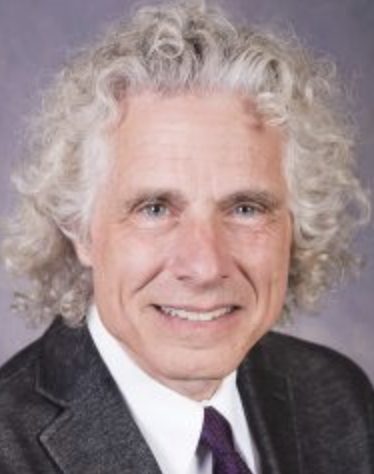On this date in 1954, Steven Pinker, who, according to The Guardian, has “the looks of a rock star, a fondness for early Woody Allen movies, and a world-class reputation as a scientist and writer,” was born in Montreal’s Anglophone Jewish community. Pinker earned a bachelor’s with first-class honors in experimental psychology from McGill University (1976) and a Ph.D. in experimental psychology from Harvard in 1979. Pinker, published extensively in the fields of linguistics and experimental psychology, taught at MIT for 21 years and now is Johnstone Professor of Psychology at Harvard.
Among his numerous books are The Language Instinct (1994), How the Mind Works (1997), The Blank Slate: The Modern Denial of Human Nature (2002), The Stuff of Thought: Language as a Window into Human Nature (2007), The Better Angels of Our Nature: Why Violence Has Declined (2011), Language, Cognition, and Human Nature: Selected Articles (2013), The Sense of Style: The Thinking Person’s Guide to Writing in the 21st Century (2014), and Enlightenment Now: The Case for Reason, Science, Humanism, and Progress (2018). His writings have frequently appeared in Time, The New Republic, The New York Times and many other magazines and newspapers.
Pinker has won numerous writing awards, was named by Time magazine as one of the most influential people in the world in 2004 and was added by Foreign Policy in 2011 to its list of top global thinkers. He was elected to the National Academy of Sciences in 2016. In addition to receiving six honorary doctorates, Pinker is a Humanist Laureate, 2006 Humanist of the Year and honorary president of the Canadian Psychological Association.
A longtime critic of creationism, Pinker wrote in a 2009 Boston Globe op-ed, “Virtually no scientist takes ‘intelligent design’ seriously, and in the famous Dover, Pennsylvania trial in 2005, a federal court ruled that it is religion in disguise.” In a 2007 Salon.com interview, Pinker and his wife, Rebecca Newberger Goldstein, said they were proud atheists. Pinker continued, “Atheists are the most reviled minority in the United States, so it’s no small matter to come out and say it. … I would put faith in the same category [as alchemy] because faith is believing something without a good reason to believe it.”
He fought and won against a proposal at Harvard to require a course on “Reason and Faith.” About that he wrote, “[U]niversities are about reason, pure and simple. Faith — believing something without good reasons to do so — has no place in anything but a religious institution, and our society has no shortage of these. Imagine if we had a requirement for ‘Astronomy and Astrology’ or ‘Psychology and Parapsychology.’ ” (The Harvard Crimson, Oct. 27, 2006.)
Pinker, who has been a guest on Freethought Radio, was awarded FFRF’s 2004 Emperor Has No Clothes Award for his plain speaking on religion and in appreciation of his forthright espousal of his rational views. He is also a member of FFRF’s honorary board.

